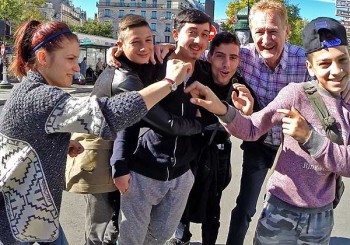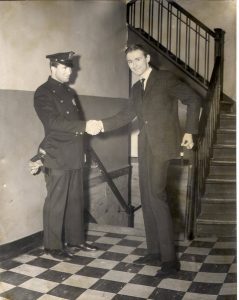
French and Romanian police have just busted 18 members of an organized crime group in Romania and Paris. The gang, actually part of a huge network, is in the business of putting children to work as pickpockets and beggars.
Europol’s press release of February 12, 2016 states that the child pickpockets worked in and around the top tourist sites of Paris and on the trains, and that they took in about 7,000 euros per day.
The report does not reveal actually who was arrested. Were they only adult organizers, or were some of the child pickpockets themselves arrested, too? Neither do we know how many people made up this particular ring (this part of the larger network). Was it ten children, a hundred, or hundreds?
Child pickpockets

What we do know is that there are many, probably hundreds, of young pickpockets scampering around Paris. We know that there’s a fine line, even a crossover, between pickpocketing and begging. And we know that a habit of these children, when arrested, is to claim that their name is Hamidovic.
Exactly one year ago, I posted the story Hamidovic Pickpocket Network—Fagin is Alive! At that time, 60-year-old pickpocket-kingpin, gangster, and child-trafficker Fehim Hamidovic, was sentenced to seven years in prison. And our official, unnameable source in Paris, The Mysterious Monsieur F., famously said about the Hamidovic network:
This ‘beast’ will soon have a new head. The arrest of the chief of the Hamidovic pickpocket network did not change anything, they are always there. And they make a carnage!
That they do. In addition to the 7,000 euros per day the underage pickpockets take in (according to police), add the untold thousands that go unreported (see my logic related to pickpocket statistics in Barcelona), and add the collateral damage in lost mobile phones, credit card abuse, man-hours expended in reporting thefts, in replacing lost drivers licenses, credit cards, passports, and other documents, etc. Petty, it is not!
Also, if you go to Paris today, you will not notice a dearth of child pickpockets. Those arrested, be they the children themselves or their handlers, were a drop in the sea. Not to mention that, if it is anything like arrests in the past, the offenders will be released in less than 24 hours. If those arrested are adults, if they were charged with human-trafficking and other organized-crime counts, hopefully they will be held until their trials.
Europol International Pickpocketing Conference
Police across Europe are finally beginning to take pickpocketing more seriously. In December, Europol held a three-day conference on pickpocketing in The Hague, in which 18 countries participated with almost 200 participants. Though not a police officer, Bob Arno was invited to (and did) speak at the conference. Bob’s knowledge base is worldwide, unlike the police, who are bound to a single city.
This week’s arrest of 18 pickpockets is a promising start to a new initiative. It won’t be easy, as these gangs morph and move, and traipse across international borders. It’s like squeezing a balloon: when the welcome wears out in one city, when a country becomes legally uncomfortable for the pickpockets, they simply move on to greener pastures. As Bob and I speak to pickpockets around the world, we hear repeatedly that Spain is a favored location, especially Barcelona. The climate is mild, living is cheap, tourism is thriving, and the police “can be dealt with.”
As long as pickpocketing is considered “petty,” arrests will be a revolving-door affair. Charging these pickpocket gangsters as human-traffickers should increase the probability that they will be held and eventually convicted.








No comment yet, add your voice below!